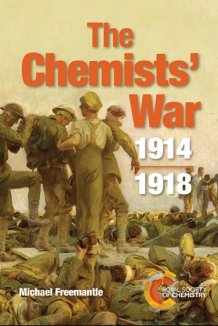
The Chemists' War: 1914 - 1918 was written by alumnus Dr Michael Freemantle
Chemists' key role in First World War
One hundred years ago, the First World War was well underway. Yet within a few months of it starting, Germany found it was running out of some of the raw materials needed to make explosives and so turned to her chemists for help. It was a similar situation in Great Britain, with chemists helping to sustain the war effort through four long years to eventual peace in 1918.
Alumnus Dr Michael Freemantle (Chemistry 1964), in his book The Chemists’ War: 1914 – 1918 (recently published by the Royal Society of Chemistry) tells the stories of the many chemists who helped to shape the conflict. His account documents the development of some of the notorious poisonous chemicals that killed and injured so many soldiers and how chemistry also helped in the care of the sick and wounded.
“The industrial-scale death and destruction in the war would not have been possible without the industrial-scale production of a vast variety of chemicals,” he said.
“Virtually every chemist in the belligerent countries, including Nobel Prize winning chemists and women chemists, contributed to the war effort in one way or another. They played key roles in the development and manufacture of not only deadly chemical warfare agents and explosives but also life-saving medicines, disinfectants, antiseptics and anaesthetics.”
Michael, a Fellow of the Royal Society of Chemistry and former editor of Chemistry International, is a science writer who has written extensively about chemistry. He is also the author of Gas! GAS! Quick, boys! How Chemistry Changed the First World War which was published by The History Press two years ago.
Both Michael’s books on the chemistry of the First World War are aimed at the general reader as well as the many scientists and historians interested in the war.
Date: 2 October 2014
